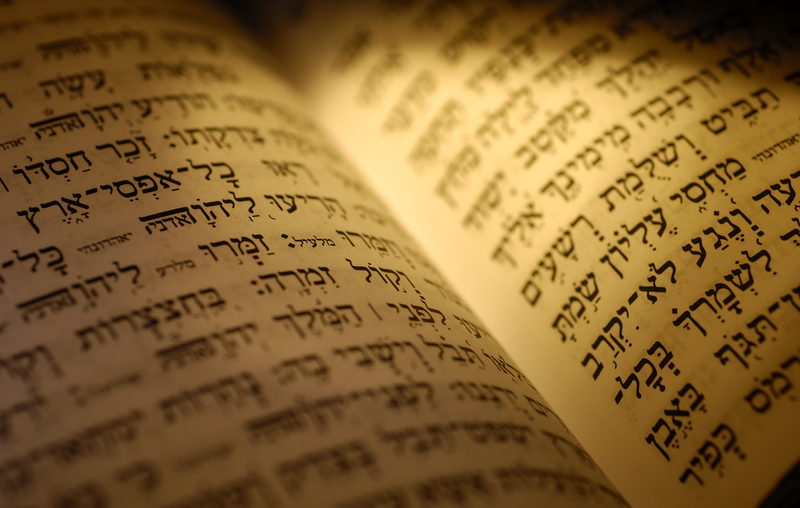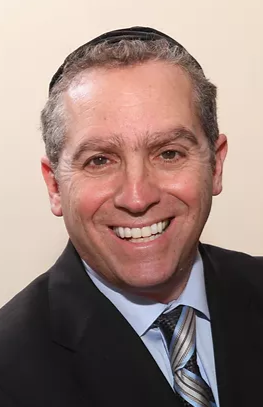
This week’s Parasha opens with the Pasuk: "Re'eh anochi noten lefnehem hayom beracha u’kelalah". Moshe is saying to B'nei Yisrael, as instructed by Hashem,"Behold, I set before you today a blessing and a curse".
The Parasha continues: "The blessing is that you observe the commandments of Hashem your G-d, that I commanded you today. And the curse if you do not follow the commandments of Hashem your G-d and if you stray from the path that I commanded you today and follow other gods [idols] that are foreign to you and that you do not know."
Why does the Torah begin this Parasha with the word re’eh,which means ‘see’ or ‘look’? Hashem is telling us very plainly: just open your eyes and look! The path is straight in front of us and it’s so very obvious! Follow the Torah and Hashem's commandments and you will see so much blessing in your life with your children and your family that it will carry you throughout your entire life. The blessing and the curse are not simply promises for Olam Habah but rather, they are here for us to enjoy today in this world!
The Malbim comments on this verse, saying that if you just look and observe, then you can actually see that the people who follow the Torah's commandments have a sense of fulfillment and accomplishment. They have a sense of spiritual growth and physical enjoyment in this world: the blessings are there for all of us to see and enjoy in the here and now.
Although most of us are able to see in a physical sense, we may be blind spiritually in terms of our understanding of this. As Rabbi Twersky explains, one may wonder why an intelligent person would continue to smoke cigarettes, knowing as we do now all the negative effects of smoking. The answer is that we see only what we want to see and we can be blind to what we don't want to see.
This theory also applies to us as Jews, because although it’s so very obvious how wonderful and special a true Torah life would be, many people will unfortunately choose not to see it. From the outside it may look hard or burdensome, but when you're in it and when it’s a part of your life, you can see how wonderful it really is. I once heard an interesting analogy in this regard: a person may be able to carry one or maybe even two of those five-pound bottles of water at a time, but it will probably be very heavy and difficult for him.
But if he were to dive into a swimming pool, then no matter how enormous the load of bottled water, he’d be able to handle it with ease. Not only would it be easy for him, it would be enjoyable. In the same way, a truly observant Jew enjoys a Torah life: it’s not difficult or burdensome in the least because the spirituality and endless rewards of that life sustain us as the water in the pool would, and its simply the most enjoyable and pleasurable life that one can have.
We may ask, why the two extremes, either a blessing or a curse? Why can't there be some middle ground, a "middle of the road"? The answer is that the Torah states that there are Mitzvot that are obligatory and sins that are forbidden. Our ethical writings eliminate any neutral category because the underlying principle of Torah living is to "Know G-d in all His ways". As Rabbi Ozeri teaches us: “Be careful of walking in the ‘middle of the road’ because you might get hit by a car!”
The Ramban presents another teaching on the blessing and the curse. All Berachot are not a reward for good deeds; rather, they are a means to an end, and are a preparation for the performance of Mitzvot and the fulfillment of Hashem's will. When we have Beracha in our lives, like good health, family, prosperity, etc, these things are given to us in order to enable us to obey Hashem's commandments.
It’s not the other way around, where one might say, I'll pray and I'll do the Mitzvot so that Hashem will bless me and reward me with health, wealth, etc. On the contrary, Hashem gives us peace and free time so that we may use it to pray properly and study the Torah. He gives us money so that we may give Tzedakah to the needy. Therefore there is no excuse for straying from the ways of Hashem: "Do not stray from the path that I commanded you today, to follow other gods [idols] that you did not know". The Torah is warning us not to get consumed by the outside culture of today, which is identical to idolatry, because it will eventually lead to your downfall, 'Has Ve’Shalom'.
Notice how the Torah uses the word "today": the reason for this is that someone may say, "I have sinned so much, it’s too late for me to change my ways." The word 'today' indicates to us that it’s never too late for someone to repent and change their ways for the better. This is another reason why this Parasha is usually read when we're about to enter the month of Elul, and begin to prepare ourselves for the days of Judgment and Atonement: Rosh Hashana and Yom Kippur. These are the days, of course, where we approach Hashem for Teshuvah and it’s a time to elevate our ways to get closer to Hashem and make a plan for growing spiritually in the upcoming year.
I read a story recently that is told by a young man visiting Israel back in August 2001, which can be a very important wake-up call for all of us as we enter the month of Elul and prepare ourselves for Teshuvah.
“I was working in a summer camp in Israel for my third summer in a row, and Thursdays were usually the day that I’d be with our cab driver from morning to night, running all over Jerusalem doing errands. Every time we passed through the center of town around lunchtime, the driver would pull up onto the curb on the corner of Yafo and King George, and I would run into Sbarros to grab him a slice of spinach pizza and a diet coke. I’d bring it back into the car for him, and we’d continue on our way. Thursday August 9th, 2001 started off no different.
As I was crossing Yafo Street about to enter Sbarros Pizza, the driver, for no reason whatsoever, ran across the street from where he was waiting for me with his car, grabbed me by the shirt, and told me not to bother going in. He decided that we were too pressed for time and that he was not in the mood for pizza. That had NEVER happened before. Standing in the middle of the street, I argued with him. I told him it’ll only take me two minutes. Finally, as the light was about to change, I gave in. I crossed back with him and got into his car. We made a right turn onto Strauss towards Geulah, and as we approached the first traffic light (by Bikur Cholim Hospital), we heard a huge explosion.
Just 90 seconds after I was about to walk into Sbarros, a terrorist detonated a bomb injuring 130 people and claiming the lives of 15 innocent men, women and children. There is no way to explain what happened on that day or how I still feel about it up to this day. I thank God for sparing me and for giving me a second chance at life. While I’m FAR from being perfect, I hope that I have done things over the years to make God feel that it was worth it. Sometimes, we can easily see God’s hand.
Other times, as it must be for those who were injured or for those who lost loved ones on that day, we are left not knowing. We are left without answers. We are left grappling for faith in the dark. I am certain about one thing though: God is great and every day of life is a gift. August 9th is my annual reminder of my commitment to being a good Jew and to making God proud of me.”
May we all have the strength to open our eyes and see all the Beracha that Hashem has given us and use the Berachot to learn more and follow the ways of the Torah. May we also turn away from outside influences so that we may grow in our observance of Torah and Mitzvot, and so that we may have families that are committed to a true Torah life. Also, may we learn from the story that every day is a gift that should inspire us to take advantage of the opportunity of Teshuvah coming upon us very soon! Amen!
Parasha perspective By Jack E. Rahmey from the teachings and guidance of Rabbi Amram Sananes.








